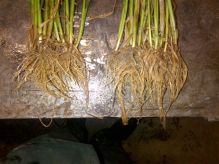Giving the plant everything it needs is the basis for high yields for Bedfordshire farmer
For many growers seed treatments start and end with the fungicide benefits. More might consider those that offer some insect protection, but for the majority it probably ends there.
Andrew Robinson, farm manager at the 1,150ha Heathcote Farms at Toddington in Bedfordshire, however, has come to regard seed treatments as the first opportunity to build crop performance.
“It’s not just about getting it established and away ahead of the winter; the young plant needs to be set-up to perform from day one if it is to achieve the high yields we aspire too. This begins the moment the seed is placed in the ground,” he says.
His latest intervention has been the addition of the complimentary seed treatment containing ZC Technology that enhances plant root development called Radiate. All wheat on the farm already receives Redigo DeterTM as standard, but based on the advice of his seed dresser ReSoSeeds he added Radiate to the mixture.
“Initially De Sangosse and ReSoSeeds offered a small trial to demonstrate the benefits of Radiate, at which point I said ‘if you’re that confident in it let’s do the whole lot’”. Mr Robinson had all 500 ha worth of seed treated.
“It’s difficult to quantify the benefit in a season like this year, but the difference in root mass between treated and untreated crop is tremendous. More roots mean increased nutrient uptake which suggests plant health should be vastly improved.”
Despite the challenges of the season he is hopeful that the benefits of this increased root activity will be noticeable come harvest.
“It would probably be easier to see the benefits of the extra root mass in a drought year, but we weren’t to know how the season would pan out when we drilled the crop; even though I’ll be disappointed if we don’t see even a slight benefit in yield this year.”
“We have provisionally booked it for next year based on the root mass alone,” he adds.
His approach is based on attention to detail and involves regular leaf tissue analysis to monitor crop health and nutrient deficiencies.
“We have been tissue testing for several years and have a good understanding of those micronutrients that are likely to be in short supply, but the differences between season’s means results vary to some extent.
“We tend to apply a lot of trace elements, typically Manganese and Magnesium, but this year we identified a shortage of Boron and Zinc that was sufficient to warrant action,” he says.
Meeting this need came at a not insignificant cost. Across the 500 ha of winter wheat grown at Toddington the cost of the Zinc came to £2,400 and the Boron a further £480, but he is confident it will be money well invested.
“It’s about giving the plant everything it needs to perform in an optimal fashion. That’s all we’re trying to do. All these little pieces make a difference,” says Andrew Robinson.
It’s an approach that produces the results. Last year the winter wheat at Heathcote Farms averaged 11.33 tonnes per hectare after drying to 14% moisture content. Over the last five years milling wheat has averaged 10.91t/ha and the soft wheat 11.46t/ha.
“We take a robust approach to crop production. We operate a high input, high output system. Our variable costs might be above the average, but it is land that if pushed can and will give you a return, though whether it will this year is yet to be seen,” he adds.
(Redigo Deter is a registered trademark of Bayer CropScience.)
